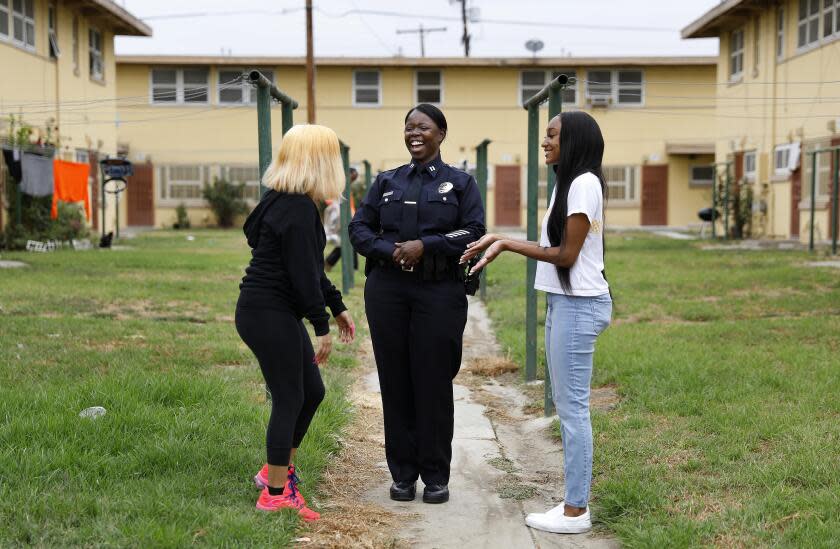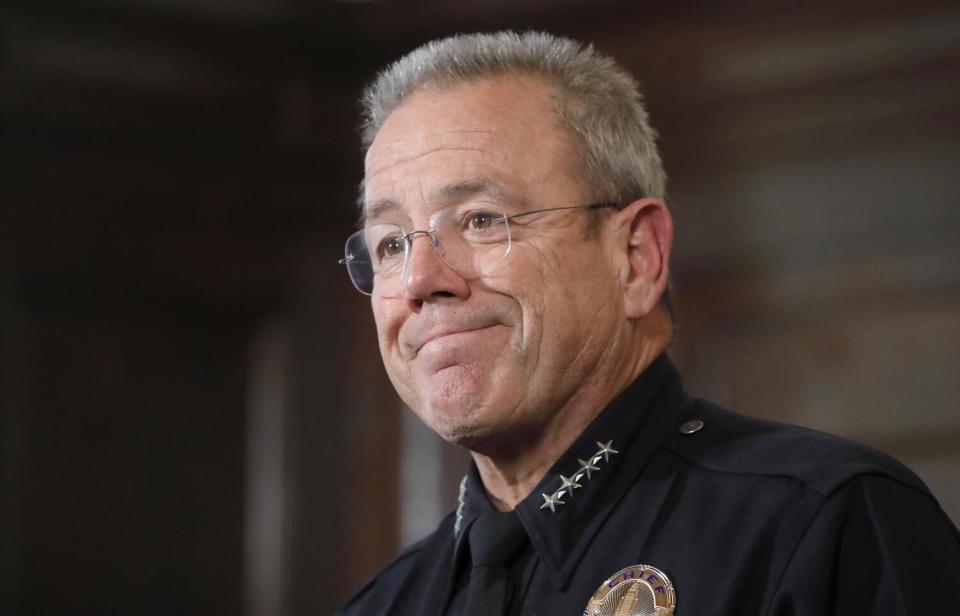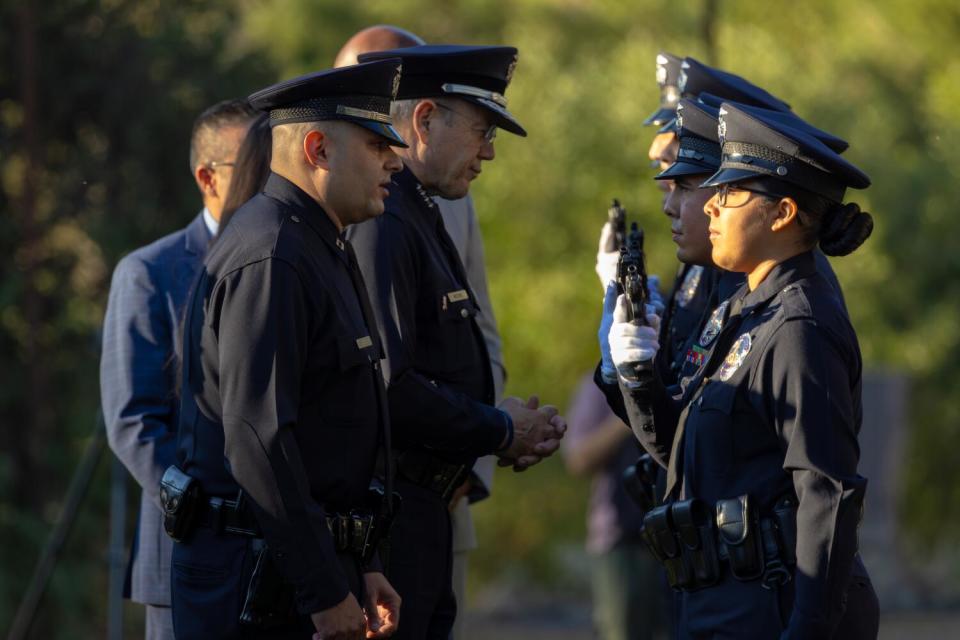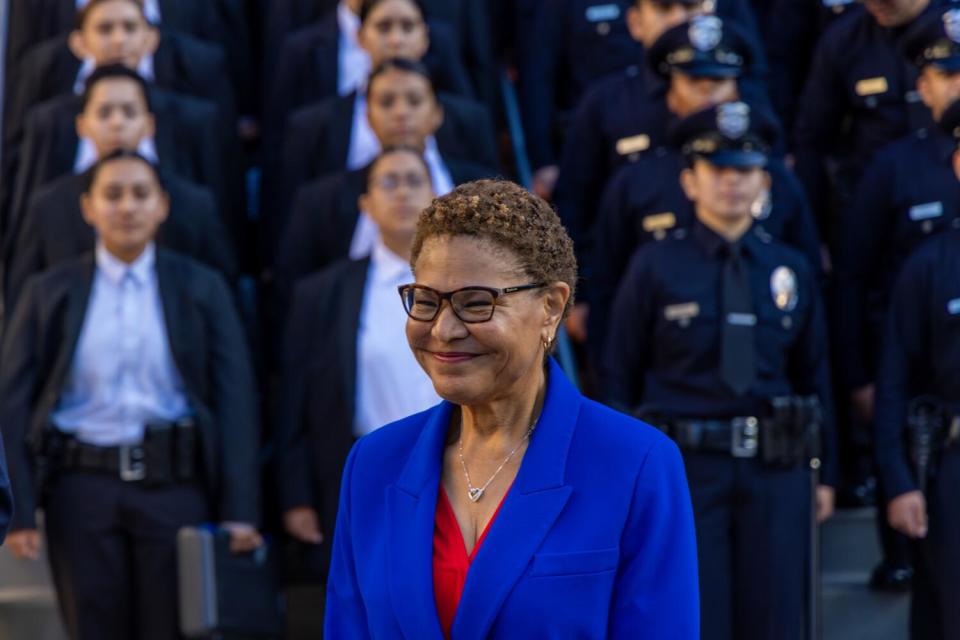As the city searches for a new LAPD chief, lack of women leaders becomes more apparent

- Oops!Something went wrong.Please try again later.
A ceremony for promotions last July at Los Angeles Police Department headquarters included a rare sight: a female commander. Three of them, in fact.
The LAPD didn't elevate a woman to commander until 1997; it took 13 more years for a woman of color to reach the rank.
Now, Chief Michel Moore's surprise Jan. 12 announcement that he will step down in late February has raised the question of whether the LAPD's next leader will, for the first time, be a woman.
Read more: LAPD Chief Michel Moore to step down at end of February
Women make up nearly 20% of the department and are similarly reflected in middle management, working as sergeants and lieutenants. A woman runs the elite Major Crimes Division, and two hold positions of influence in the counterterrorism and transit services bureaus. The Office of Constitutional Policing and Policy is overseen by a civilian who is a woman.
But the unfolding search for Moore's replacement has exposed a stark reality: There are few women on the force with the rank and experience to compete for the top job.

Of Moore's 12 deputy chiefs, two are women. All three of his assistant chiefs are men.
The imbalance has fueled criticism of Moore over what some have seen as slow progress on gender equity under his leadership and an unwillingness to challenge a culture of sexism and harassment that has resulted in numerous lawsuits by LAPD officers in recent years.
The Police Commission, which will pick an interim chief, held an emergency closed-door meeting Jan. 19 to narrow down a list of contenders. According to LAPD sources, who were not authorized to speak publicly about the confidential search, the list includes two women, former assistant chiefs Sandy Jo MacArthur and Beatrice Girmala, and a number of high-ranking men who are currently serving.
Read more: Police commission begins considering interim LAPD chief to replace Michel Moore
After Chief Charlie Beck retired in 2018, there was speculation around City Hall and police headquarters that the moment could be ripe for the first female chief. But Girmala, an early favorite, did not apply, and MacArthur — who retired in 2015 — did not make the final list of three candidates.
The job eventually went to Moore. Girmala and two high-ranking women of color, Regina Scott and Beverly Lewis, left the LAPD in the intervening years. Their ranks were filled by men.
Before announcing his decision to retire, Moore defended his record in an interview with The Times, saying he has promoted each of the few women eligible to become commander; roughly 1 in 4 LAPD officers holding that rank now are women. Moore also pointed to the number of women working on antigang teams and other specialized units that were once considered off-limits to them.
“Twenty years ago, these units would have none or one,” Moore said. “These positions and experience build proficiency and confidence for officers to go to the next level of leadership.”
The LAPD is facing the same problems recruiting and retaining women as other U.S. police forces, and that has severely shrunk the pool of promotional candidates, Moore said.
MacArthur, who had a 41-year LAPD career, said past chiefs such as William Bratton “really paid a lot of attention in developing the leadership inside the department,” including for several women.
LAPD career development, MacArthur said, typically started at the captain level and continued with mentorship and exposure to a variety of roles. The process paved the way for the next generation of leaders to learn the nuts and bolts of running a multibillion-dollar organization and to prove their readiness for more responsibility.
“You do things to develop a ‘bench,’ so that the next time a chief leaves, you hopefully have multiple somebodies inside an organization who could potentially take over the job," MacArthur said in an interview last year.
Other women who seemed poised for promotion within the LAPD have languished for years before making captain or commander.

Among them was Lillian Carranza, a longtime captain who was one of the three women promoted to commander at the summer ceremony at LAPD headquarters. Her name had been near the top of a list of commander candidates since May 2018. Yet she was passed over for promotion again and again.
Read more: LAPD captain files sexual harassment lawsuit, alleging culture of sexism, cruel pranks in department
Carranza has sued the department several times for sexual harassment. One suit resulted in her being awarded $4 million in damages over leadership's handing of a situation in which officers circulated a photo of a nude woman that some falsely claimed was her. Since 2018, at least eight men who were ranked below her on the eligibility list have been promoted to deputy chief or assistant chief.
Even with the promotions, women are disproportionately underrepresented among Moore's innermost circle of decision-makers, his critics say. Some department insiders say a perceived lack of opportunity has led to the departure of several high-ranking female officials in recent years.
The reasons for this are many, the insiders say. One theory is the widespread perception of tokenism — the belief that women have a real shot only at leadership roles that were vacated by other women. Others say the department is not doing enough to provide mentoring and networking opportunities for female employees. Additionally, officers who are mothers sometimes delay seeking advancement until their kids are older or gravitate toward investigative roles with more family-friendly schedules that may not put them on the fast-track for promotion.
The two highest-ranking women in the department are both deputy chiefs. One is Ruby Flores, who had been one of the longest-serving commanders before her promotion in November to replace a retiring male deputy chief, Kris Pitcher.
The other is Emada Tingirides. She was promoted by Moore in 2020 and is considered a rising star who helped shape the LAPD’s community policing approach. In a jump that was nearly unprecedented, Tingirides skipped several ranks when she was elevated from junior captain.
Tingirides led the Community Safety Partnership bureau, which has been credited with reducing violent crime and improving relationships in some of the city’s most troubled housing developments. In 2023, she was placed in charge of the South Bureau, the department's busiest, a move seen as offering the operational experience she missed because of her rapid ascension.
For months, her name has been bandied around police headquarters and City Hall as a possible chief candidate, along with current Assistant Chief Blake Chow and Art Acevedo, a career lawman who once served as chief of the California Highway Patrol and went on to be the top cop in Houston and Miami, according to sources who requested anonymity because they were not authorized to discuss the hiring search publicly.

Female officers at the LAPD and elsewhere are said to face a “brass ceiling” that blocks advancement, similar to the invisible blockade that has led to male-dominated executive leadership in the fields of politics, business and tech.
Read more: LAPD expands community policing program, appoints Black female deputy chief
Critics argue that Moore hasn't done enough to break down the barrier, repeatedly passing up qualified female candidates and promoting men instead. An internal LAPD analysis obtained by The Times shows that Moore elevated 35 men to the rank of commander and above during his first five years as chief, compared with just five women.
Until the 1970s, the few female officers who served were required to wear long skirts and nylons and were barred from riding in patrol cars. Most were entrusted to work only on juvenile cases. They were not allowed to be promoted above the rank of sergeant.
Consent decrees and court orders would force the department to diversify its ranks in the decades that followed.
The mostly white and male LAPD branded in the country's imagination by TV shows like "Dragnet" is no more. Some of Moore's backers credit him with recent contributions to the diversity efforts. Moore promoted two Asian American men to assistant chief, and officials of color run three of the four geographical bureaus.
The department is now more than half Latino, much like the racially diverse city it patrols. And the sight of a female supervisor running a crime briefing barely rates a glance anymore from officers filing into a roll call room. Women now make up about 19% of the LAPD, compared with an average of 12% at other departments nationwide.

While hurdles remain, women wearing LAPD blue today are encouraged to pursue career opportunities, said Cmdr. Shannon Paulson, a 33-year department veteran who is second-in-command at the Counter-Terrorism and Special Operations Bureau. "In many respects, it's better than society at large," she said.
But the LAPD’s ratio of women to men is roughly the same as it was in 1997, the year Betty Kelepecz became the first female commander.
Female police executives are still a rarity, although recent years have seen New York City, Atlanta, Sacramento, San Francisco and Seattle hiring women to run their police departments. Washington has a female police chief, and women hold 10 of the 18 top command positions. Houston and Dallas also have a significantly higher number of female senior staffers than the LAPD.
While there's no consensus on whether female officers have a different philosophy on policing than their male colleagues, studies have shown them to be less prone to violence and more likely to use problem-solving skills to de-escalate volatile situations.
Women in leadership tend to be more collaborative and are more likely to challenge long-standing ideas about policing, at a time when departments across the country are under pressure to change police behavior, according to Connie Rice, a civil rights attorney who has worked closely with the LAPD on reforms in recent years.
Department officials may have rooted out the outright sexism that prevailed in law enforcement for decades, evidenced by male officers who didn't want to work with women or refused to back up female colleagues on calls, according to Rice. But the LAPD is still dogged by allegations that a crude, misogynistic culture exists within the ranks, she said, and women in uniform face obstacles to advancement.
"The men get to run the 100-meter dash, and the women get to run the 200-meter hurdles," said Rice. "When it comes to promotions, the comments are, 'She's not tough enough.' They'll find every reason in the world not to promote a woman. But they'll promote their drinking buddies."
Others disagree, saying that despite the challenges they face, women wearing the LAPD uniform have more opportunities than those in other agencies.
Moore has met regularly with representatives of the Los Angeles Women Police Officers and Associates, which seeks to boost recruitment of female officers. Moore has also internally touted his efforts to improve gender equity, boasting at a meeting of command staff several weeks ago that he has promoted more women than any of his predecessors to ranks of captain or higher.
Some insiders fear that in the LAPD's relationship-based culture, such efforts are undermined by a perception that officers are more likely to move up the ranks based on who they know, rather than on merit.
Los Angeles Police Protective League director Debbie Thomas wrote last August in her column in the police union’s monthly magazine that hiring and promotional decisions are driven in large part by “identity-based goals,” rather than “merit.”
“As a female officer, I stand to benefit from these quotas if they existed," Thomas wrote, adding that she is "1,000%" against such a system. "I don’t need the help an identity boost can provide, and I’ll be damned if I’m going to come to work having those I lead snipe at my heels because they are convinced I didn’t earn my way to the position.”
In his interview with The Times, Moore denied that the department promotes people who aren’t qualified, saying he had taken steps to bring greater fairness to a promotional process that for years “people believed was biased and unfair.”
At the same time, he acknowledged the headwinds in trying to attain greater diversity.
“Having a substantial number of women in law enforcement is a new concept that is only now beginning to be seen and not just talked about," he said. "As with any cultural evolution, it challenges the convictions of some, manifesting into allegations of not being qualified.”

Mayor Karen Bass has promised a nationwide search for a replacement for Moore. At the end of the process, which will likely take months, the commission will present Bass with its top three candidates, then her pick will be voted on by the City Council. Moore has said he will stay on until that time in a consulting role.
Pundits say picking a chief is one of the most consequential decisions a mayor makes.
This story originally appeared in Los Angeles Times.

